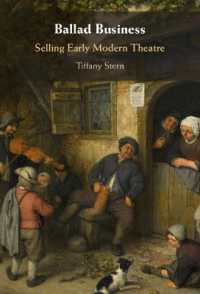- ホーム
- > 洋書
- > 英文書
- > Business / Economics
Full Description
The "Red Baron" from Local 213 of the International Brotherhood of Electrical Workers (IBEW) was Les McDonald, once a firebrand Communist activist and the youthful leader of the left faction within the Vancouver electrical workers' union. His fate would be intertwined with the Lenkurt Electric strike of 1966, a wildcat strike that led to the imprisonment of four trade union leaders. Following his involvement as a long-time trade unionist, McDonald went on to be better known for his dedication to the establishment of triathlon as an official sport of the Olympic Games. However, McDonald's important role in Local 213 and the Lenkurt strike—a watershed moment in Canadian labour history—was, until now, the untold story of the first half of his life.
Referencing Local 213's Minute Books, newspaper articles, collected correspondence, as well as dozens of personal interviews conducted by the author, this book examines the history of IBEW Local 213 in the turbulent years leading up to the Lenkurt strike. In addition to describing these events and their important historical ramifications, author Ian McDonald chronicles how his father helped to rebuild a left faction within the local union. With a focus on the period between 1955 to 1985, this ground-breaking study of a single construction trade union local—its brief post-World War II experience with Communist leadership, well-known work-site militancy, and repeated interventions by the IBEW's International Office—sheds light on the local's "red" minority activism and ultimately explains why McDonald returned to the world of sport to finish his career.
-

- 電子書籍
- ごはん日和 Vol.35 おいしい県民…
-

- 電子書籍
- メンヘラちゃん(上)






